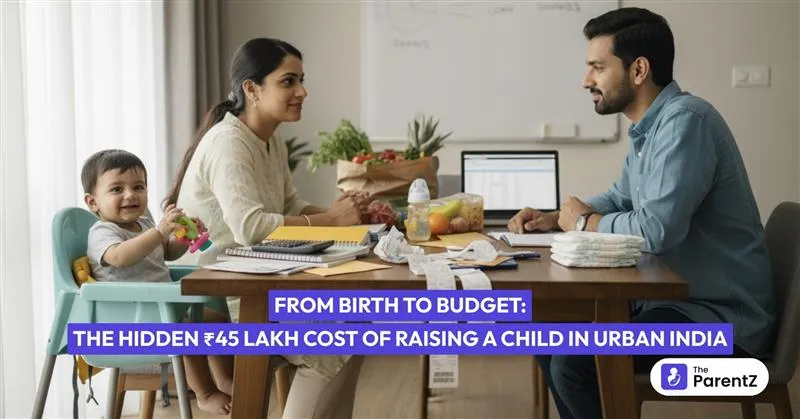A few years ago, if someone asked you what costs ₹45 lakhs, you'd probably think of a nice flat in a tier-2 city. Maybe a luxury car. Or ten years of honest savings for an average middle-class family.
Today? That's what it costs to raise one child in urban India.
Let that sink in.
When young couples today say, "We're scared to have kids because we can't afford it," they're not being dramatic. They're being realistic. And honestly, the numbers back them up.
The Math That No One Wants to Talk About
Let's break this down the way your bank statement would.
Ages 0-5 (The "Cute" Phase That Drains Your Savings):
- Hospital delivery: ₹1.5-2.5 lakhs
- Vaccinations: ₹30,000-50,000
- Baby gear, food, diapers: ₹3 lakhs
- Daycare in metros: ₹20,000/month (that's ₹2.4 lakhs a year)
Total for the first five years: ₹7-8 lakhs
And your child hasn't even started school yet.
Ages 6-17 (When Reality Hits Hard):
This is where things get scary. Private school fees run anywhere from ₹2-4 lakhs per year. Multiply that by 12 years. Then add tuition classes (because school isn't enough anymore), coaching for entrance exams, uniforms, books, gadgets, and those "mandatory" extracurricular activities.
Dance? ₹25,000. Cricket coaching? Another ₹30,000. Olympiad prep? There goes more money.
Total: ₹17 lakhs
Ages 18-22 (College: The Final Boss Level):
Private college fees: ₹10 lakhs minimum. Hostel, food, misc expenses: ₹3 lakhs more.
Total: ₹13 lakhs
Add it all up, and you're looking at ₹38-45 lakhs. And we haven't even talked about the ₹80 lakh wedding that society expects you to fund.
It's Not Just About Money; It's About What You're Giving Up
57% of middle-class income now goes toward raising one child.
Think about what that means, as it is more than half your salary. Every month. For 20+ years.
It means:
- Delaying buying a home (or never buying one)
- Postponing retirement plans
- Living paycheck to paycheck despite having a "good job"
- No emergency fund because every rupee is already allocated
In 1995, our parents could raise kids AND buy a house. In 2025, you pick one.
The Emotional Trap We're All Stuck In
The reason this hurts so much is because we've been told that being a "good parent" means giving your child everything. The best school. The best coaching. The best opportunities.
Instagram and WhatsApp groups don't help. You see other kids learning coding at age 8, and suddenly, you panic. "Am I failing my child?"
Fintech apps now literally let you pay school fees in EMIs. Think about that. We're treating education like buying a smartphone, in instalments.
Government schools? They lack basic facilities like functioning toilets. So, private school feels like the only option, even if it's crushing you financially.
What Do You Do?
First, breathe. You're not a bad parent for worrying about money. You're a realistic one. The following are some things that might help:
- Question the "essentials": Does your 6-year-old really need three different hobby classes? Or is that pressure coming from outside?
- Focus on skills, not brands: A child who learns financial literacy, practical problem-solving, and emotional intelligence will go further than one who just has expensive toys and certificates.
- Invest in yourself too: Teaching your child that parents matter is important. Your retirement fund isn't selfish; it's practical. You can't pour from an empty cup.
- Talk about money openly: Start these conversations early. Let kids understand that money is finite and choices have trade-offs. That's not harsh; that's real life.
- Don't compete with the Sharmas: Their financial situation isn't yours. Their priorities aren't yours. And their Instagram posts aren't the full story.
Conclusion
The best thing you can give your child isn't expensive tuition or a fancy school name on their certificate. It's financial awareness. The ability to make smart money decisions. The confidence to choose a path that makes sense, not one that looks good on paper.
Because here's what the ₹45 lakh figure is really telling us: The system isn't designed for middle-class families to thrive anymore. It's designed to keep you running on a treadmill.
Having kids shouldn't mean signing up for 20 years of financial stress. But until things change, like having better public schools, affordable healthcare, and realistic education costs, parents need to be smarter, not just harder-working.
You're not wrong to feel overwhelmed. You're not weak for worrying about money. You're just living in a time when parenthood has become an expensive luxury instead of a natural life choice.
And maybe, just maybe, it's time we all admitted that out loud.








Be the first one to comment on this story.